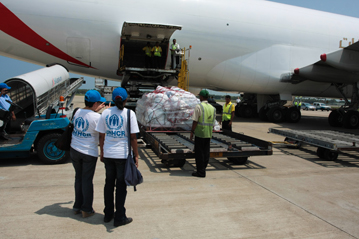Burundian refugees return to north despite fighting in central province
Burundian refugees return to north despite fighting in central province

MUYINGA, Burundi, Jan 24 (UNHCR) - Despite intense fighting in central Burundi, refugees continued this week to stream back to their homes in the more peaceful northern part of the country.
"I felt deeply in myself that I had to come home," said Nduwimana, a 25-year-old mother of one who goes by one name only. "I saw that other people from my area were coming and I didn't want to miss the chance," she said on Thursday at the transit camp in Mugano, where she was collecting UNHCR provisions designed to see her through her first three months back in her home village of Rusenyi.
She was one of 353 Burundian refugees who returned home from Tanzania on Thursday in one of the twice-weekly voluntary repatriations run by the UN refugee agency. Most in the group - including some who had been in Tanzania's camps since fleeing Burundi's civil war in 1993 - were back in their home villages by evening.
UNHCR has a maintained a policy to assist returns only to the relatively safe northern region of Burundi. Under an agreement reached at a tripartite meeting between the governments of Burundi and Tanzania early last year, the refugee agency transports returnees mainly from camps in Ngara, Tanzania. They pass through one of two transit centres (Songore and Mugano), both in Burundi's Muyinga province, and on to drop-off points close to their villages of origin.
Thursday's returnees said they were well informed about the fighting in Gitega province, central Burundi, that had broken out earlier in the week. The fighting is reportedly some of the most intense in 10 years of civil war. A large part of the population there - estimates range from 40,000 to 60,000 people - has been displaced by the fighting between the Tutsi-led army and Hutu rebels.
"I heard on the radio that there was fighting (in Burundi) but I know it was not near my village or province, so I decided to come on home," said Sindakira Nduwayezu, an 18-year-old man in the UNHCR return convoy. "My father died in Tanzania, but my mother is here in Burundi, so at least I will have a place to live."
"Refugees in the camps in Tanzania are very well informed about the situation - peace or war - in Burundi," noted Leonidas Nkurunziza, the officer in charge of UNHCR's field office in Muyinga. Still, he added, "People are very attached to their homes. They want to leave Tanzania and come back."
So far this year, some 2,400 Burundians have returned to their homes in the northern part of the country through the Kobero border crossing near Muyinga. The number has fluctuated since the voluntary repatriation began last March, with as many as 600 crossing on some days this month.
It does not always go smoothly, though. Last week, a group of 32 homeward-bound Burundian refugees got stuck for eight days at the UNHCR transit camp at Songore, eastern Burundi, because of security problems near their home area of Kigamba village in Cankuzo commune.
"We were well informed about the fighting, but life in the [Tanzanian] camp was rather boring, so we decided to come back despite the continued violence," said Gilbert Ntitangirageza, 27, speaking for the stranded group.
"We would rather stay at the transit camp instead of going home and meeting assailants on the road," he told a UNHCR official as the group prepared for a longer stay in Songore. But a few minutes later, word came that it was safe to move, and the group boarded trucks for the last leg of their journey.
The 353 who returned home on Thursday were tired, hungry and subdued, but full of hope. "When I get to my village, they will come to welcome me, especially my uncle," said Nduwimana. "I am very optimistic."
Indeed, many early returnees found their relatives and neighbours who had stayed behind to be extremely welcoming. Rashid Miburo, a 22-year-old farmer, returned home last July after seven years as a refugee in Tanzania. On Thursday he welcomed his younger brother back to his village of Giteranyi.
"I will help him the way people helped me when I came back last year," said Miburo. "The neighbours helped me a lot by giving me food, and some people gave me kitchen utensils. They also helped me build my house."
In December, the Burundi government signed a cease-fire agreement with the rebel factions, but the agreement has done little to quell the fighting in the country. New peace negotiations are set to begin on Monday in Pretoria, South Africa.
Whatever the outcome, many of the new returnees say their life as refugees is behind them forever. "I am confident about the future of the country," said Gerard Nikobamye, 22, a refugee since 1998, as he sat aboard a truck preparing to take him home earlier this week. "But even if war erupts again, we will stay here with the others. We will never go back to the camps outside our country."









